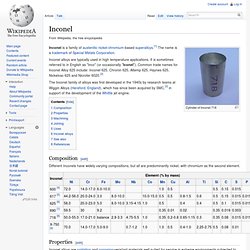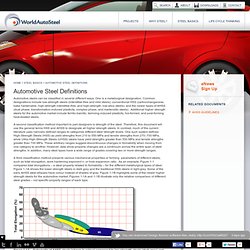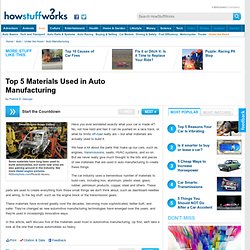

Inconel. Cylinder of Inconel 718 Inconel is a family of austenitic nickel-chromium-based superalloys.[1] The name is a trademark of Special Metals Corporation.

Inconel alloys are typically used in high temperature applications. It is sometimes referred to in English as "Inco" (or occasionally "Iconel"). Common trade names for Inconel Alloy 625 include: Inconel 625, Chronin 625, Altemp 625, Haynes 625, Nickelvac 625 and Nicrofer 6020.[2] The Inconel family of alloys was first developed in the 1940s by research teams at Wiggin Alloys (Hereford, England), which has since been acquired by SMC,[3] in support of the development of the Whittle jet engine.
Composition[edit] Different Inconels have widely varying compositions, but all are predominantly nickel, with chromium as the second element. Properties[edit] Machining[edit] Inconel is a difficult metal to shape and machine using traditional techniques due to rapid work hardening. Cutting of a plate is often done with a waterjet cutter. Joining[edit] European Steel Map / Facts & Figures / Eurofer - Eurofer. Automotive Steel Definitions. Automotive steels can be classified in several different ways.

One is a metallurgical designation. Common designations include low-strength steels (interstitial-free and mild steels); conventional HSS (carbonmanganese, bake hardenable, high-strength interstitial-free, and high-strength, low-alloy steels); and the newer types of AHSS (dual phase, transformation-induced plasticity, complex phase, and martensitic steels). Additional higher strength steels for the automotive market include ferritic-bainitic, twinning-induced plasticity, hot-formed, and post-forming heat-treated steels. A second classification method important to part designers is strength of the steel. Therefore, this document will use the general terms HSS and AHSS to designate all higher strength steels. A third classification method presents various mechanical properties or forming parameters of different steels, such as total elongation, work hardening exponent n, or hole expansion ratio .
Steel Business Briefing steel industry news, steel prices, steel directory, steel events, steel market research, steel maps. Steel Types. Top 5 Materials Used in Auto Manufacturing" Have you ever wondered exactly what your car is made of?

No, not how hard and fast it can be pushed on a race track, or what its limits off-road really are -- but what materials are actually used to build it. We hear a lot about the parts that make up our cars, such as engines, transmissions, seats, HVAC systems, and so on. But we never really give much thought to the bits and pieces of raw materials that are used in auto manufacturing to create these things. The car industry uses a tremendous number of materials to build cars, including iron, aluminum, plastic steel, glass, rubber, petroleum products, copper, steel and others. These parts are used to create everything from those small things we don't think about, such as dashboard needles and wiring, to the big stuff, such as the engine block or the transmission gears. These materials have evolved greatly over the decades, becoming more sophisticated, better built, and safer.